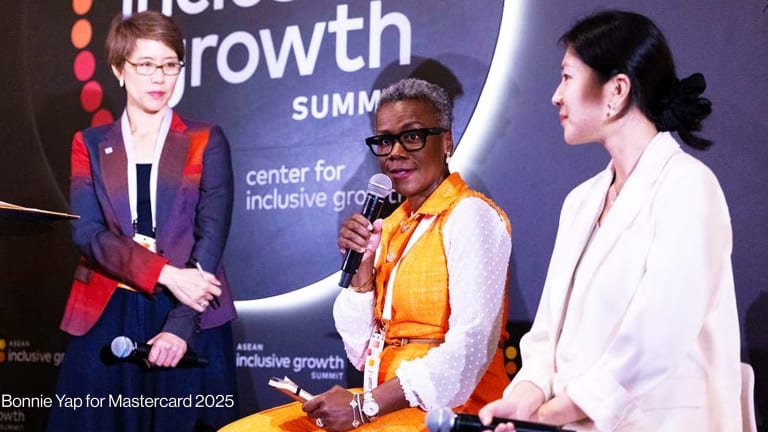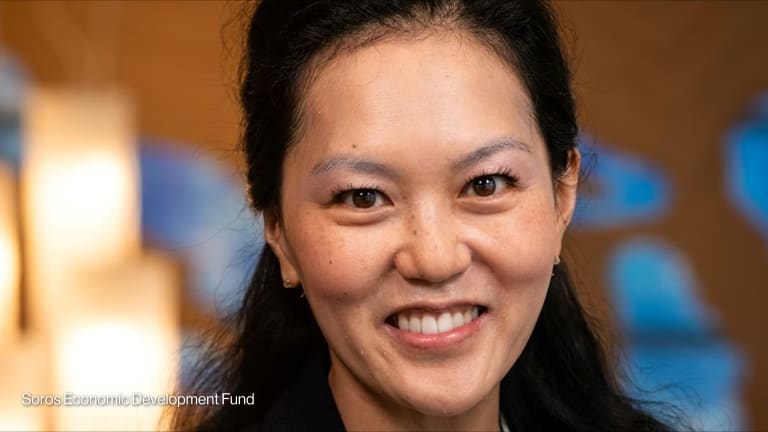Q&A: Kiva eyes impact investing after surpassing $1B in loans to women
Goldie Chow, director of impact at Kiva, discusses the organization's evolution and how it plans to support financial inclusion for women moving forward.
SAN FRANCISCO — Kiva's loans to female entrepreneurs have exceeded $1 billion, the nonprofit announced on Monday. More than 80% of Kiva loans go to women. Over the past two years, the organization has expanded its model — from a crowdfunding platform connecting lenders and borrowers to an effort to expand financial access globally. Kiva has reached 2.7 million women in 94 countries [a]with its loans, and the organization is exploring how it might also support women through impact investing. “Our tool is financial inclusion. Does that mean we don’t care about poverty? No. It means that we care about poverty, but we also care about access to finance more broadly.” --— Goldie Chow, director of impact, Kiva Devex spoke with Goldie Chow, Kiva’s director of impact, about the evolution of the organization and the ways it plans to support financial inclusion for women moving forward. This interview has been edited for length and clarity. Can you tell me more about why Kiva brought you on board, how it represents a greater emphasis on impact at Kiva, and what that looks like in practice? Coming into Kiva, a good amount of work had already been done in terms of how do we think about impact and how do we define our mission and our progress toward it. But the question was — how do we operationalize it? Social organizations always talk about impact and data, but a lot of times it’s just because we need to for an annual report to a funder. Funders and foundations can nudge organizations toward more impact, but where I've seen most of the real authentic accountability, is when it comes from the top. Who you report to is always a good indicator. In the places I’ve consulted, it’s been to the chief marketing officer or chief fundraiser, but here at Kiva, I report to the chief investment officer. Impact doesn’t just show up in our annual report. It’s actually something that shows up in our [objectives and key results]. The basis for that is having a strong enough framework that we can rely on it. What are you actually trying to do, and how do you know you’re doing it, and how do you think of it in terms of [key performance indicators]? Our impact framework builds on the overall sharpening of mission and vision and strategy. At Kiva, for a long time, it was about the connection. It was about peer-to-peer, it was about the platform, it was about poverty. I think we had to get very clear on: Our tool is financial inclusion. Does that mean we don’t care about poverty? No. It means that we care about poverty, but we also care about access to finance more broadly. First, you have to have alignment around mission, around vision, around strategy. And then from there, you build a framework. Maybe in the past, it was all about measuring poverty, but if our goal is to reach excluded populations and bring access to finance in a responsible manner, that’s what we need to be measuring. So poverty is one aspect of that, but so are a lot of things. An example of a project you might not have pursued before the sharpening of strategy you mentioned is Kiva Protocol, or using blockchain to benefit the unbanked in Sierra Leone. How does that fit into this new mission? This is really about the system of digital identity and credit in Sierra Leone, and moving forward, we have ambitions to replicate this kind of work in other countries. But how does that fit into an overall mission? One way we’ve helped make sense of this for external parties, and for internal parties, is to explain the three lines of financial inclusion we’re going for. First is what we’re known for: How do we work to go down market in financial inclusion? How do we work with partners to nudge them toward innovative products? How do we work with marginalized populations? The second line is the idea of institutional impact investment — scaling the work. We’ve de-risked refugee lending. Why not scale that and facilitate the scaling of that through institutional capital? And the third is the systems-level change with Kiva Protocol. If we care about impact, we should be ambitious, and it shouldn’t be tied to “oh well it has to be a retail vendor at $25.” That is still a very amazing thing, and we want to grow it, and we need to grow it. It kind of enables everything else. But there’s just so much capital sitting on the sidelines, so much capital going into impact investing where we don’t believe the impact is strong, and maybe as the initial purveyors of democratized impact investment we should be playing in broader impact investment. Can you expand on the role Kiva Labs is playing as a research and development unit for financial inclusion? And how you rely on subsidies so you can operate as part of the portfolio without the same financial pressures as other parts of the organization? At the end of the day, it is more difficult and more expensive to work with groups of individuals — whether it’s women or whether it’s refugees — to provide access to loans where they don’t have access. There’s a reason. We play a role with this kind of capital and this kind of platform, but for it to be successful, it’s not just Kiva on its own — we have to work with partners to be thoughtful around how to provide support with more than just the product itself. Kiva is almost fully subsidized in that we don’t make a return. We don't cover all our costs without some form of donor capital, whether it’s an individual donor or a foundation or a lender who’s donating $1 out of the $25. That’s always been the case. We’re inching toward more of a clear framework for segments of the portfolio, meaning instead of this free for all market, we’re very clear about different parts of the portfolio requiring more or less subsidy. Kiva Labs is the place where were clearly, on a per impact unit or per dollar unit, we’re losing more money, but we are okay with it. And that’s the same with any R&D department. You have said that while retail lenders got Kiva where it is today, you are working toward a future where only a small part of your overall funds will come from crowdfunding. Can you expand on that? And in the same way you scaled lending for refugees with the launch of the Kiva Refugee Investment Fund, could the same thing happen for women? Impact investing focused on women would let us continue to expand and scale financial inclusion for women. And why wouldn't Kiva be a player there given that we care about this? We would be a very good player or partner toward women’s empowerment focused fund. If I’m going to be really ambitious and talk like my CEO, we want funds everywhere sooner or later. It’s just an expansion of what we already do. It’s also something already happening in the world. We feel we are best positioned to really do impact investing for real, meaning you've got the scale, you also have the low risk, and you actually have the impact — and that’s something that's always a bit debatable in broader contexts. Ideally sooner or later, just like we care about refugees — and we think there is a way to harness all the good that people and individuals and institutions want to support — the same thing goes for women’s empowerment, for small businesses, for agriculture. We really have developed expertise in several key sectors or types of marginalized populations and we just want to continue that.
SAN FRANCISCO — Kiva's loans to female entrepreneurs have exceeded $1 billion, the nonprofit announced on Monday.
More than 80% of Kiva loans go to women. Over the past two years, the organization has expanded its model — from a crowdfunding platform connecting lenders and borrowers to an effort to expand financial access globally. Kiva has reached 2.7 million women in 94 countries [a]with its loans, and the organization is exploring how it might also support women through impact investing.
Devex spoke with Goldie Chow, Kiva’s director of impact, about the evolution of the organization and the ways it plans to support financial inclusion for women moving forward.
This story is forDevex Promembers
Unlock this story now with a 15-day free trial of Devex Pro.
With a Devex Pro subscription you'll get access to deeper analysis and exclusive insights from our reporters and analysts.
Start my free trialRequest a group subscription Printing articles to share with others is a breach of our terms and conditions and copyright policy. Please use the sharing options on the left side of the article. Devex Pro members may share up to 10 articles per month using the Pro share tool ( ).
Catherine Cheney is the Senior Editor for Special Coverage at Devex. She leads the editorial vision of Devex’s news events and editorial coverage of key moments on the global development calendar. Catherine joined Devex as a reporter, focusing on technology and innovation in making progress on the Sustainable Development Goals. Prior to joining Devex, Catherine earned her bachelor’s and master’s degrees from Yale University, and worked as a web producer for POLITICO, a reporter for World Politics Review, and special projects editor at NationSwell. She has reported domestically and internationally for outlets including The Atlantic and the Washington Post. Catherine also works for the Solutions Journalism Network, a non profit organization that supports journalists and news organizations to report on responses to problems.








